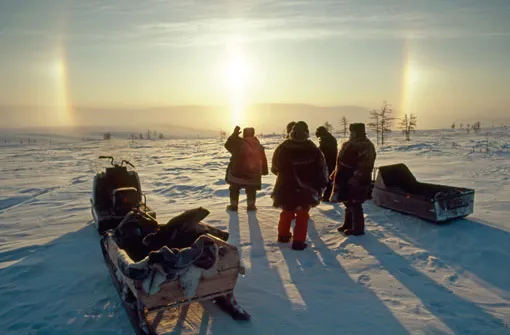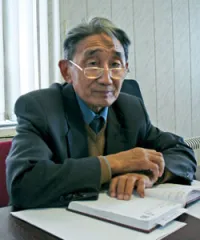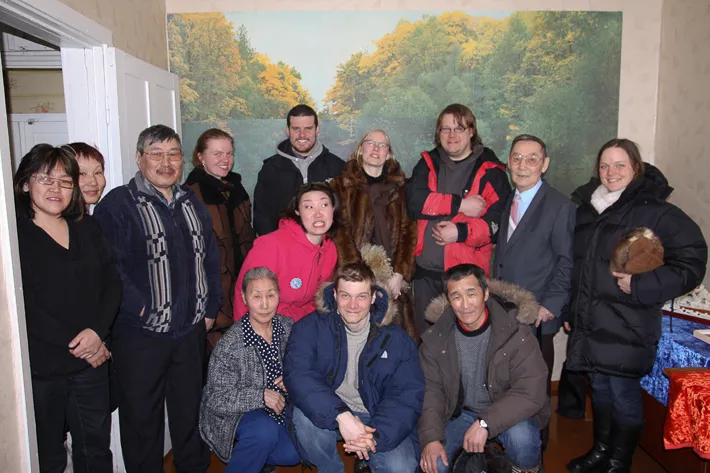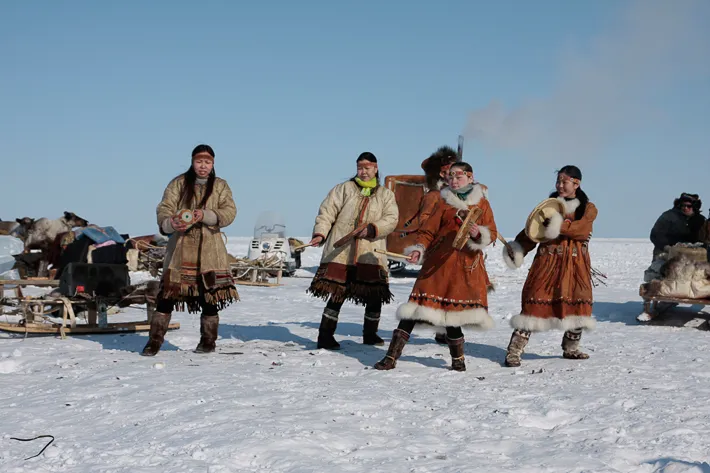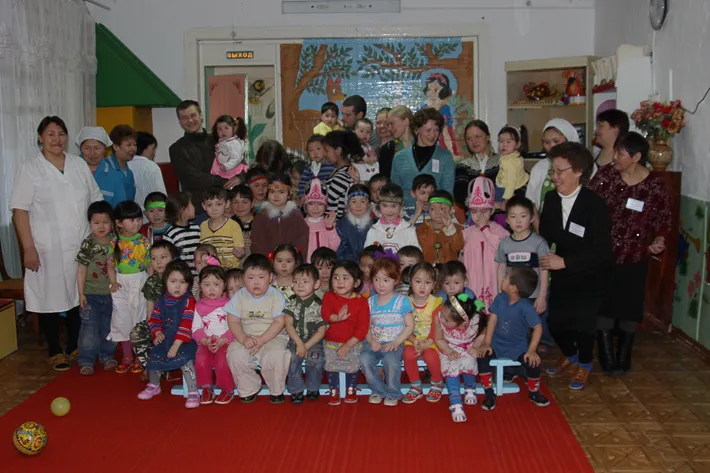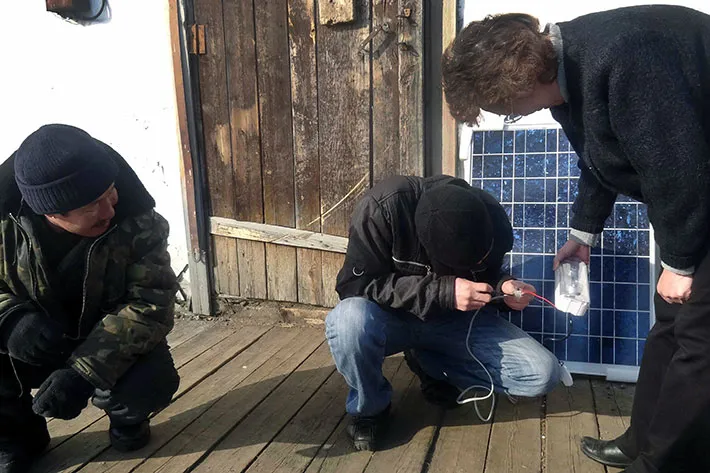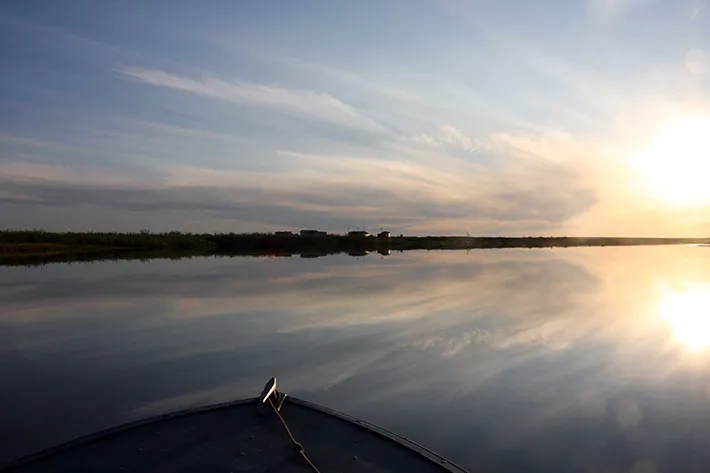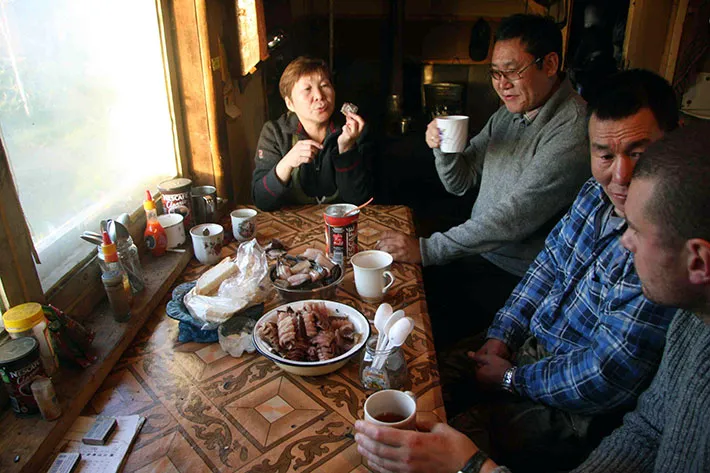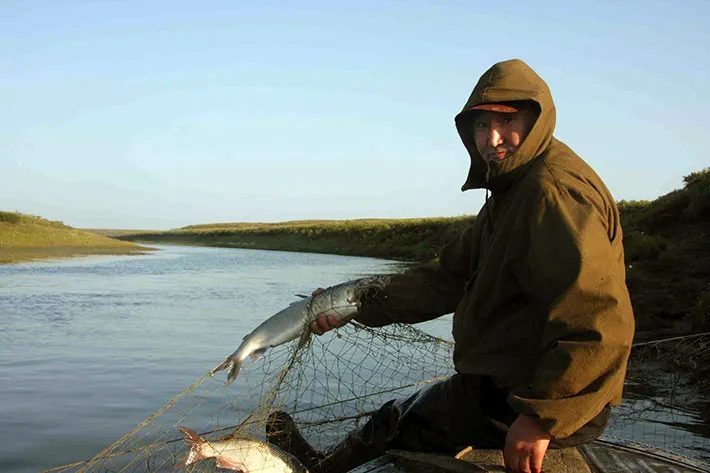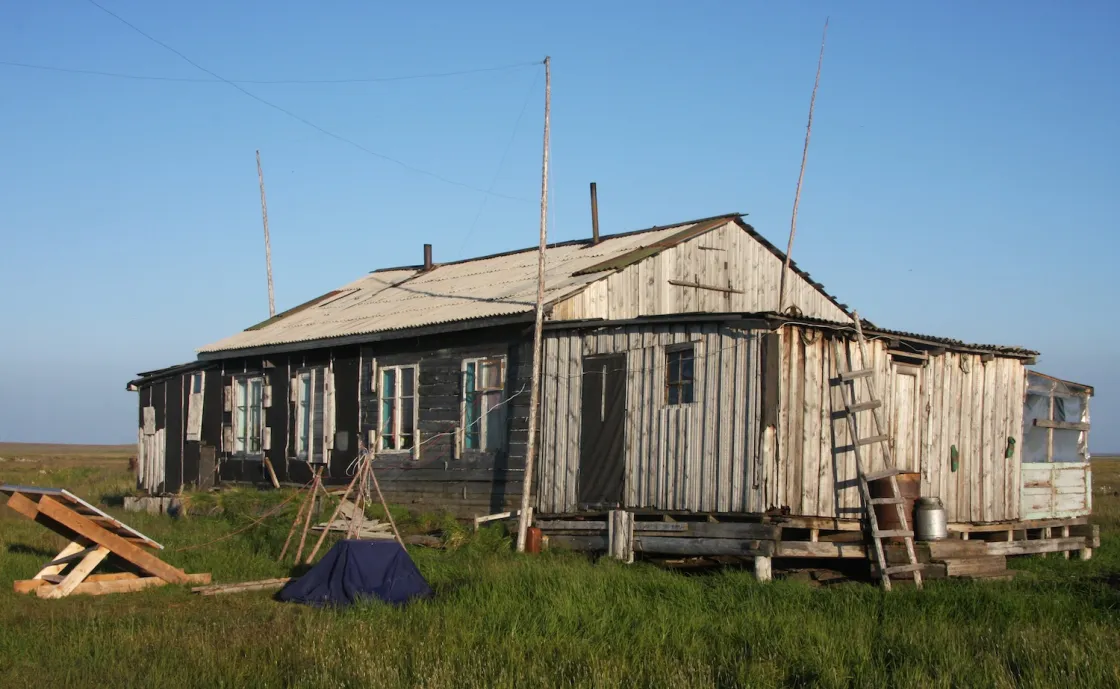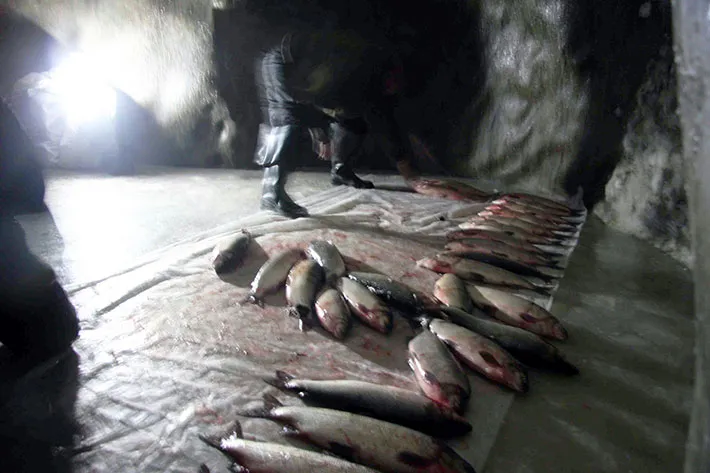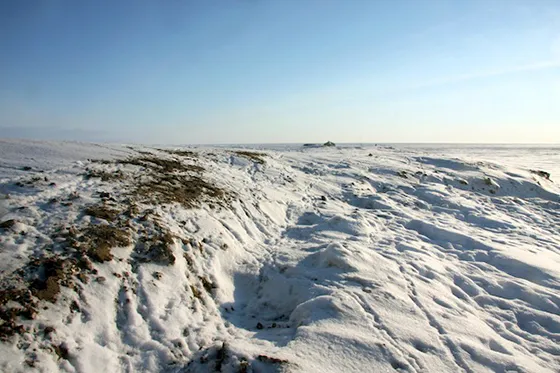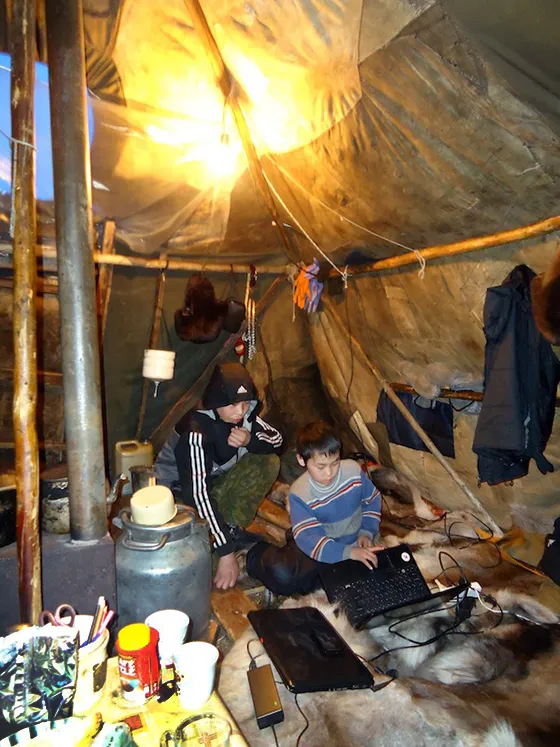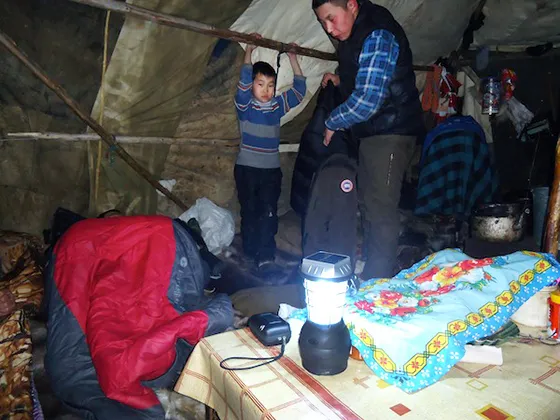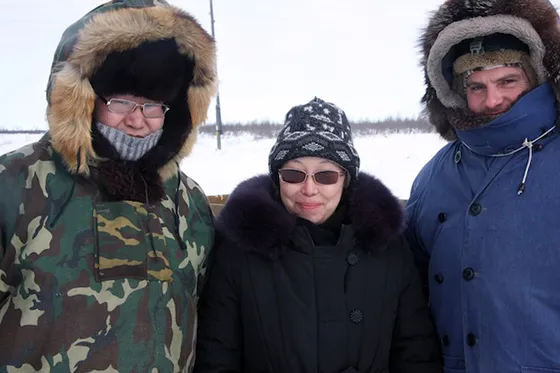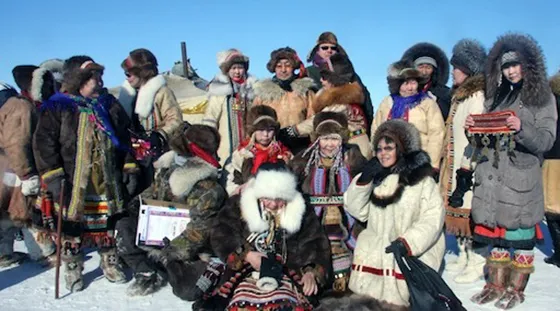Snowchange Oral History
About
These Web pages are devoted to two Indigenous Chukchi communities, Turvaurgin and Nutendli, in the settlement of Kolymskaya, which is in the Northeastern Corner of the Republic of Sakha-Yakutia, Siberia, in the Russian Federation. Community residents practice seasonal nomadic reindeer herding and other subsistence activities that are being affected by climate change. Consequently, this region has become a pilot model area for the Integrated Ecosystem Approach to Conserve Biodiversity and Minimize Habitat Fragmentation in the Russian Arctic (ECORA) project and a Snowchange Cooperative partner.
The Snowchange Cooperative is a non-profit educational, scientific, and environmental independent organization, where all members are stakeholders. A lot of the work is scientific documentation of traditional and Indigenous knowledge to do with observations of cultural, climatic and ecological changes. Snowchange is collaborating with ELOKA to present the history, culture, and contemporary environmental situation of Turvaurgin and Nutendli.
The community and scholarly partnership between Snowchange and the communities of the region was initiated by the President of the Northern Forum Academy, Vladimir Vasiliev, along with the late, great Honorable Scientist of the Russian Federation, one of the leaders of the Even people, Professor Vasilii Robbek. These pages are devoted to the memory of Mr. Robbek and his lifework.
Since 2008 the Indigenous Chukchi Turvaurgin Community has worked with Snowchange Cooperative and Northern Forum Academy to solar-electrify nomadic reindeer camps of the Khalarcha Tundra. This work is done under the auspices of the Barefoot College led by Mr. Bunker Roy based in Tilonia, India. In 2009 a specialist from Turvaurgin, Mrs. Maria Krivoshapkina was trained as a qualified solar panel engineer in India. In 2010-2011 the project partners worked to deliver the first solar panels to the pilot brigades to tundra. The panels are scheduled to arrive in summer 2011. The Snowchange Cooperative funded the pilot phase of the project and the Arkleton Trust based in the UK is monitoring the project. The monitoring effort is led by Mr. Chris Madine from Newcastle, the UK. The Arkleton Trust provided the initial contacts and facilitated the project start. Through the work of Mr. Madine, the Trust continues their monitoring efforts on this initiative.
Project Activities 2008-2011
Between 2008-2011 the Nutendli community developed another herding brigade and participated in the solar panel pilot project too. A member of the Nutendli, Mr. Kemlil received a major social recognition "Hero of the Russian Federation" in 2010. Nutendli works closely with the Snowchange Cooperative on issues of nomadic schooling, traditional knowledge and reindeer herding in the context of climate change.
In the period 2008-2011 the Turvaurgin community, following the initiatives and energy deriving from the solar panel project and other developments embarked on a road of self-determination and rebuilding which has no close parallels in the contemporary Russian Arctic. This process owed much to the leadership of Mrs. Yelena Antipina, the head of village of Kolymskaya as well as the head of Turvaurgin, Mr. Vladimir Andreevich Romanovskii and vice-head Mr. Pyotr Kaurgin. We should also recognize the role of President of Northern Forum Academy Mr. Vladimir Vasiliev and the Head of the Yukaghir People Mr. Vyacheslav Shadrin in this process as coordinators.
In 2010 the village and community of Kolymskaya (Turvaurgin) held the first ever National Assembly of Chukchi Peoples in the Republic of Sakha-Yakutia. International guests from England and Finland participated. Senior politicians from Yakutsk and Moscow flew to the tundra for the first time and saw the situation and positive development which is under way in the community. Following the charter and the declaration of the National Assembly the municipality was declared "National Chukchi Territory" in late 2010.'
Additionally the community received land use rights under the Indigenous legislation in early 2011 where their areas were declared "traditional nature use territories" of Indigenous peoples. It means the Indigenous culture, ways of life and nomadic economy will survive.
In order to celebrate these events the Snowchange Cooperative released a break-through publication "At the Gates of the Sun—A Snowchange Book of Images from Indigenous Nomadic Communities of the Republic of Sakha-Yakutia, Russia" in early 2010 in English and Russian to document the life of the region for the international audiences. This book can be ordered for 25 USD plus shipping from contact@snowchange.org.
In Spring 2011 the Turvaurgin community released the first Lower Kolyma Chukchi ABC Book ever for the schools of Kolyma. Language nests following the Maori models from Aoteoroa / New Zealand will be implemented too. Summer 2011 the community has organized traditional knowledge camps for the young women and girls of the community to learn skin sewing and many other reindeer skills. Nomadic education will be developed too in cooperation with the Snowchange Co-op and the United Nations.
In November 2011 delegates from the Snowchange Cooperative and Turvaurgin will participate in the international workshop “ELOKA” to be held in Colorado, USA devoted to the themes of traditional knowledge and community healing.
2012
In 2012 representatives of the Turvaurgin community presented the climate change, solar electrification, traditional knowledge and nomadic lifestyle issues in a major international event “Climate Change Mitigation with Indigenous Peoples and Local Communities” held in Cairns, Australia in March–April 2012. This international UN–related event was jointly organized by the Intergovernmental Panel on Climate Change (www.ipcc.ch) and United Nations University. The Snowchange work in Kolyma received major media attention too, for example in National Geographic.
After the IPCCC-UNU event, the Kolyma delegation spent time with the Australian Aboriginal people, hosted by Mr. Victor Steffensen from the Traditional Knowledge Revitalisation Pathways. This connection had developed initially in 2008 in the Snowchange Aoteoroa Gathering in December 2008.
In Spring 2012 the solar panels were installed in a pilot-style into a Turvaurgin nomadic brigade as well as the remote fishing bases along the Kolyma river and the Chaigurginoo remote fishing base of Turvaurgin.
In August 2012 Chris Madine from the UK, the international monitoring person for the solar panel project, and Tero Mustonen from Snowchange travelled 1,500 kilometers along the Kolyma river and the East Chukchi Sea to review the implementation of the solar panels in the nomadic brigades and in Chaigurginoo. Results were compiled into an English-language report available from the Snowchange Cooperative. Initial savings were up to 60% in terms of diesel reductions in the Chaigurginoo fishery base.
In Autumn 2012 sad news was received from the nomadic community of “Nutendl.” The beloved Elder and knowledge holder of the Yukaghir and Chukchi peoples, Mrs. Akulina Kemlil passed away. Also Vyacheslav Kemlil, originally from Nutendli, initiated a new nomadic community in the lower Kolyma area.
2013-2014
In 2013, again, major events took place in the communities on Lower Kolyma. Mrs. Yelena Antipina, the coordinator for various activities of Snowchange local work, was appointed as the Rector of the College of the North in Cherskii, Kolyma.
On the 15th of May, 2013, a seven year scientific study on Arctic biodiversity, titled “Arctic Biodiversity Assessment” (www.arctic biodiversity.is) was released to the public. The Lower Kolyma nomadic communities participated extensively in this work, and their knowledge and oral histories were included into this historical inquiry of how the Arctic is changing.
In May 2013 there was an accident at the fishing base of Chaigurginoo. The log house at the base camp received damages in a fire, but the panels and batteries were saved with minimal damages.
Towards June 2013 there was a major regional conference on Regional Energy at the city of Yakutsk, where Mrs. Yelena Antipina participated, representing the solar electrification pilot project. Our aim is to now seek a domestic energy company to avoid the costly import processes and increase the availability of panels and training to all nomadic and fisheries camps in Lower Kolyma over the next five years.
Following the resolutions of the 2010 Chukchi National Assembly, the first pilot installment of the nomadic school “Nennen” was planned to be held in July 2013 on the tundra with Turvaurgin.
In June of 2013 the project partners promoted the traditional knowledge work in domestic events in Republic of Sakha-Yakutia (mainly in the NE Russia Conference on Renewable Energies). They did the same from August to December 2013 in a series of international events in Finland, the UK and Sweden. Chief Vyacheslav Shadrin visited North Karelia, Finland in October 2013, when plans were made for 2014. In early December, ELOKA representative Henry Huntington arrived in Selkie, North Karelia, Finland for discussions.
In December 2013, Nutendli, one of the partner communities of Snowchange, located in the Lower Kolyma, Republic of Sakha-Yakutia, Russia, was hit with a horrible tragedy. Igor Kemlil (son of Vitali Kemlil, one of the leaders of Nutendli), together with his wife Tanya and their daughter Liza as well as Tanya’s mother Yana froze to death in their tundra camp in hurricane winds during a blizzard.
This tragic turn of events fostered all project partners to double our efforts for international cooperation in Kolyma and to support Nutendli.
Therefore, in March-April 2014, an international team from the UK and Finland landed in Kolyma to visit all communities in the region, where they presented Russian and English versions of the ELOKA websites and discussed steps for this year. Now that the Russian version of the website is under way, an experimental Chukchi-language component of the materials and new contents is being discussed.
Additionally, a major presentation about ELOKA and Snowchange activities was given at the “Modern Technologies in Reindeer Herding” Workshop in Cherskii, in early April. Immediately following the trip, another major presentation about the ELOKA-Snowchange trip and community priorities was given at the Arctic Observation Summit in Helsinki, Finland.
With the generous international support of the Arkleton Trust, UK (a long-term supporter of the solar panel project in Kolyma) and the University of Eastern Finland, along with ELOKA and Snowchange efforts, the 2014 trip was made possible. Domestic funders were the Northern Forum Academy, Institute of Indigenous Peoples, Arctic Peoples College—Cherskii, and the Nomadic Communities of Nutendli and Turvaurgin. We are extremely thankful to all supporters of this work.
The nomadic communities wish to extend their personal thanks to Chris Madine, Henry Huntington, Caroline Higgs, Peter Pulsifier and Chris McNeave for their work to realize different aspects of the ELOKA-Snowchange project in Kolyma.
A monitoring document about the solar panel efforts in 2014 was released in April and it is available here.
2014 will continue with presentations of the work in different forums, and actual community work weekly to test and implement the solar panels for the summer period of 2014, and seek further support for the range of Snowchange activities in Kolyma from nomadic schooling to biodiversity and climate work.
In conclusion we can say that the Indigenous societies of Kolyma are on a historical path of retraditionalisation. They have preserved nomadic way of life through the Soviet times, emerged as survivors from the early post-Soviet times and are now transforming their societies to come through the Arctic climate and cultural change with their core systems intact in the 21st Century. We can determine that these unique nomadic communities are a shining beacon of light and hope in one of the harshest climates of the Arctic.
2015-2016
Snowchange work with the Lower Kolyma communities has continued without breaks between Autumn 2014 and the end of 2016. Climate change impacts and observations, dissemination of traditional knowledge materials, and community development have proceeded well.
In November and December 2014, the Snowchange work in Kolyma was featured during the Arctic Summit held in Yakutsk. During this governmental event a proposal was put forward to establish a World Heritage Area in Khalarcha Tundra of Lower Kolyma, a territory which is of national interest to the Chukchi.
For much of 2015, the Snowchange coordinators and community focal points continued to test the solar panels placed in Chaigurginoo and international efforts were made to expand the panel programme. In September 2015, Snowchange delegates participated in the ELOKA Workshop in Boulder, Colorado, USA to share the latest from the Kolyma communities. Towards the end of 2015, a Snowchange delegate for the United Nations Framework Convention on Climate Change (UNFCCC) Conference of Parties (COP) in Paris, Chief of the Yukaghir Council of Elders, Mr. Vyascheslav Shadrin, received an award by the Paul K. Feyerabend Foundation for his traditional knowledge work.
In spring 2016, after a decade of preparations, a major traditional knowledge publication featuring the Kolyma oral histories was released. “Life in the Cyclic World” has two parts. Part one of the Compendium is a much-needed overview of the traditional knowledge and biodiversity of the Indigenous peoples of the Eurasian North. It includes reflections on the socio-ecological systems of the Indigenous Nations of this region. Questions of traditional customary systems, oral histories and governance are included. Critical examination of overharvests and their historical context is analyzed.
Part two includes an extensive description of the shifts and imposed changes of the region from the late 1800s to the 2010s. Special focus includes oil and gas development, modernity, hydropower and forestry, mining, nature conservation, oceans, rivers, lakes and fisheries, and mammals and birds. In the conclusions an initiative of nomadic schools for Siberia is proposed as one of the mechanisms to preserve traditional knowledge and communities on the land.
In April 2016, coordination meetings between Snowchange and Kolyma representatives took place in Norway. This paved the way for the Second Festival of Northern Fishing Traditions, which was held in Zhigansk, on the Lena River, in September 2016. A photo essay of the event is available.
Last Updated: Wed, 11/30/2016
All materials on this Web site are © Tero Mustonen, Snowchange Cooperative, unless otherwise stated. All rights reserved.
